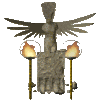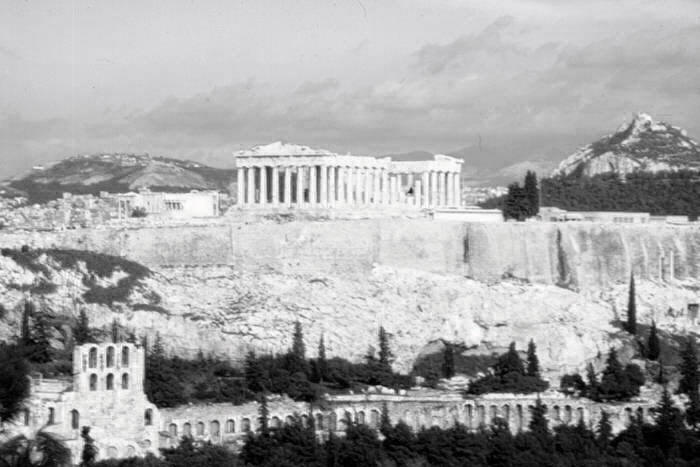|
|
|
 Greek
Timeline
Greek
Timeline

594 BC
Solon, the great elegiac poet, is appointed chief magistrate of Athens. His reforms include both political and economical adjustments which lead to dissatisfaction in the upper and lower classes.
585 BC
In Miletus, the founding city of philosophy, Thales predicts a total eclipse of the sun. The founder of the Melesian school, Thales, teaches that all things are composed of moisture; he is the first to put forth a rational explanation of the cosmos. By the end of the sixth century, philosophers begin to question the metaphysical nature of the cosmos with inquiries into the nature of being, the meaning of truth, and the relationship between the divine and the physical world.
546 BC
The first of the Athenian tyrants, Peisistratus, replaces Solon as ruler.
530 BC
Pythagoras and his followers found the city of Croton and combine philosophy and literature with political activity as the foundation of their community. Pythagoras, mathematician and philosopher, is credited with the Pythagorean theorem and the Pythagorean table of opposites (the "dualism" that underlies Greek thought).
525 BC
Greek drama grows out of the Dionysian festivals. The plays of Aeschylus are considered to be the beginning of this long history of tragic drama. His stories are drawn from conflicts between the individual and the cosmos.
518 BC
Pindar, considered by some to be the greatest Greek lyric poet, is born in Cynoscephalae, Boeotia. Pindar's odes celebrate games held at the religious festivals of Greece. Athletic victory serves as the ground for his poetic fancy and his religious, moral, and aesthetic insights. He dies in 438 BC.
515 BC
Parmenides of Elea is born. He is the founder of the Eleatic school in the Phocaean colony in southern Italy. He is the first to focus attention on the central problem of Greek metaphysics: the nature of being. For Parmenides, the laws governing the universe are stable. Change is merely an illusion.
510 BC
Hippias, the son of Peisistratus, succeeds his father and is overthrown by a group of nobles with the help of Sparta.
508 BC
Cleisthenes, the father of Athenian democracy, rules Athens. His reforms grant full rights to all free men of Athens.
500 BC
The height of Greek sculpture begins with the work of Phidias. His masterpieces include the statue of Athena in the Parthenon , the Parthenon reliefs and the statue of Zeus in the Temple of Olympian Zeus. The second most important sculptor, Myron, is renowned for his statue of the discus thrower.
490 BC
Lasting until 479 BC, the Greeks initiate war with Persia when Persia, at this time the strongest power in western Asia, establishes rule over Greek-speaking cities in Asia Minor. The Persian Wars are commonly regarded as among the most significant in all of history. Darius the Great is defeated at the battle of Marathon in 490 BC The Greeks emerge victorious and put an end to the possibility of Persian despotism.
486 BC
A contempoary of Darius the Persian, Heraclitus of Ephesus lives somewhere around this time. For Heraclitus, reality is flux which originated out of fire (as opposed to Parmenides' "stable" reality.
485 BC
Accompanying the high point of democracy in Athens is a Greek intellectual revolution, with its beginnings in Sophism. The Sophists situate ethics and politics within philosophical discourse which, before, was limited to physics and metaphysics alone. The leading Sophist, Protagoras, states his famous doctrine: "Man is the measure of all things." For him, all truth, goodness, beauty, etc. are relative to man's necessities and inquiries. Emerging in opposition to the Sophists are Socrates, Plato and Aristotle, each of whom offers alternatives to the Sophists' relativism.
484 BC
The father of history, Herodotus, is born. He is author of a nine-book History of the Persian War and a book dedicated to his travels through Egypt. He dies in 420.
478 BCE
Athens joins with other Greek city-states in the formation of the Delian League. The League continues even after the end of the Persian Wars and transforms into a naval empire with Athens as its leader.
469 BC
Sophocles is born. He is the second Greek dramatist, following Aeschylus, and is considered by some to be the greatest of the Greek dramatists. His works include Oedipus Rex and Antigone. He dies in 406 BC. This year also marks the birth of Socrates, a philosopher of ethics who leaves no written philosophy. He is the major critic of popular belief in Athens and is the protagonist of Plato's dialogues. He is condemned to death in 399 BC on the charges of corrupting the youth and introducing new gods into Greek thought.
461-429 BC
During this "Age of Pericles," Athenian democracy reaches perfection, and the court systems are completed. A jury system is put in place with the jury serving as absolute authority in judicial matters.
448 BC
Aristophanes, considered by some to be the greatest Greek comedy writer, is born. He dies in 380 BC. Greek comedy, like Greek tragedy, originates out of the Dionysian festivals.
431-404 BC
During the Peloponnesian War between Athens and Sparta, the political supremacy of Athens is ended. Athenian trade is destroyed. Athenian democracy is overthrown, and Athens is forced to surrender to Sparta as a subject state. Sparta assumes dominance over the Greek world and replaces many Greek democracies with oligarchies. The two major causes of the war are Athens' growth in imperialism and the economic and cultural differences between Athens and Sparta. Between 404 and 338, Sparta is not able to persist in the rule of Greece. Power over Greece shifts from Sparta to Thebes and then to numerous other city-states, none able to maintain rule over such a large empire.
427 BC
Plato, Socrates' most distinguished student, is born. He is a prolific writer and is considered by some to be the most important of all philosophers. Among his most noted works are The Apology, The Symposium, The Phaedo, The Phaedrus, and The Republic. His written works are in dialogue form. He dies in 347 BC.
406 BC
Euripides dies. Born in 480 BC, he is the last of the tragic dramatists. His contribution to the history of Greek tragedy is his creation of a drama that deals with situations analogous to human life.
384 BC
Plato's most distinguished student, Aristotle, is born. He enters Plato's Academy at the age of seventeen. After spending several years as tutor to Alexander the Great, Aristotle returns to Athens and founds the Lyceum. Among his writings are treatises on logic, metaphysics, ethics, politics, rhetoric and several on natural sciences. He dies in 322 BC.
350 BC
Hellenistic Greece witnesses the new philosophy of the Cynics. Their leader, Diogenes, puts forth the first argument against conventional life. The Cynics believe that people should live naturally and strive for self-sufficiency.
343 BC
The greatest dramatist of Hellenistic Greece, Menander, follows the comedic genre put forth by Aristophanes (the subject of which is romantic love).
338 BC
Philip of Macedon, Alexander the Great's father, conquers Greece and is succeeded by his son two years later. At age twenty-two, Alexander begins his campaign to acquire new territory in Asia. Within four years, Alexander conquers the entire Persian Empire (including Asia Minor, Egypt, Persia, Syria and Mesopotamia). Alexander continues his campaign farther east and eventually returns to Persia in 323 BCE, where he dies of fever in Babylon. Before his death, Alexander was the ruler of the largest empire the world had seen. Hellenistic Greece, a combination of Greek and western Asian cultures, lasts from Alexander's time until the beginning of the Christian era.
If you have any questions or comments feel free to e-mail me.
Senior Project : 2001-2002 The Great Persian Empire Website